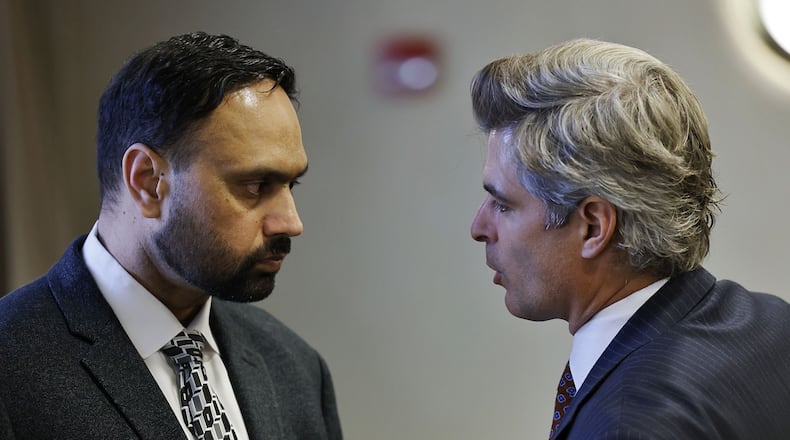The legal wrangling concerns Gurpreet Singh’s defense team, which was retained, requesting public money to hire defense experts in the death penalty case.
Credit: Nick Graham
Credit: Nick Graham
Gmoser objected to Butler County Common Pleas Judge Greg Howard’s decision in which the judge stated he would consider specific requests filed by the defense for experts, but would not give the defense team a blank check.
A team of attorneys from Rittgers and Rittgers were retained by Singh family members at the time of his arrest in 2019, but they no longer have the funding to pay additional experts the defense says is needed.
A terse response was filed by the defense to Gmoser’s objection, which prompted another pointed response from Gmoser.
Singh, 39, is charged with four counts of aggravated murder for the April 28, 2019, homicides. With specifications of using a firearm and killing two or more persons, Singh faces the death penalty if convicted.
Credit: Nick Graham
Credit: Nick Graham
Singh is accused of killing his wife, Shalinderjit Kaur, 39; his in-laws, Hakikat Singh Pannag, 59, and Parmjit Kaur, 62; and his aunt by marriage, Amarjit Kaur, 58, at their residence on Wyndtree Drive. All died of gunshot wounds.
Gmoser objected to the decision in a motion for reconsideration, stating the decision sets a precedent for allowing defense counsel to charge attorney fees that are equal to the defendant’s total assets then request public funds to pay for a mitigation expert, private investigators and forensic experts.
“It begs the question of whether or not any attorney hired privately should be questioned by the court in advance of doing any work if the representation is capable without taxpayer assistance,” Gmoser said in the objection. “The choice should be obvious that if a privately hired attorney takes everything a client has for the agreement of representation, the attorney should complete it or get off the case and return the money paid to the client.”
Singh’s defense team responded to Gmoser’s motion, noting the request for public funds does not pertain to attorney fees, but for investigation and experts only.
“The State of Ohio provided no authority for its outlandish proposition that the state can dictate how privately retained counsel structure their representation fees,” attorney Neil Schuett wrote in the response signed by lead attorneys Charles H. and Charles M. Rittgers.
Schuett said Singh, a truck driver and father of two, has been in the Butler County Jail since he was arrested in August 2019 and unable to work. He said Singh has $270 in his bank account and no other assets.
Singh had received money from relatives in India to hire the defense team, but “that well is now dry,” according to Schuett. The defense team asked for $50,000 to $60,000 from the state to hire expert witnesses throughout the trial, which is set to begin in October 2022.
Prosecutors said that prior to his arrest, Singh was employed as an owner-operator of a semi-tractor trailer, which is typically valued at $75,000 and $175,000, and that he had at least one bank account with a balance of $75,052.31 and owned real estate in Indianapolis valued at $330,180. Prosecutors also say the defense team has been paid $250,000, according to court documents.
“The fundamental point is this, the state, the government, the taxpayers of Butler County should not be involved in in a private agreement,” Gmoser said during Wednesday’s hearing referring to Singh’s agreement to hire his attorneys. “When they blow it because they made a bad choice, it is up to them to give the money back and get out and let court-appointed counsel that is death-certified take over the case.”
Gmoser said the judge’s decision is setting a precedence and the state will have to file motions in cases where attorneys are appointed to assure they will see the case through with fees they have been given.
Howard, who represented many defendants in death penalty cases before his election to the bench, noted death penalty certification of attorneys is not required if the accused retains an attorney.
The judge said he doesn’t like the decision he made, but the last thing he wants is to try the case and have an appellate court overturn the outcome, finding he should have approved money to hire experts.
Howard also said Singh’s attorneys will be staying with the case.
“If they filed a motion today, next year or a week before the trial because they were out of money, I am never going to grant that,” Howard said.
The judge added, “I certainly respect the state’s decision position. But the bottom line as of right now, I have not handed out a dime.”
Singh is due back in court later this month where specific motions concern funding for defense experts may be considered. He is scheduled to stand trial in October 2022.
About the Author



